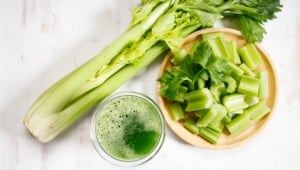9 Health Benefits of Pineapple Juice & 3 Recipe Ideas

Pineapples were once considered a staple food for Native Americans. The first encounter of the Western world was when Columbus saw pineapples in Guadeloupe in November 1493. Find here all of the health benefits of pineapple juice as well as tasty recipe ideas.
Pineapple juice offers plenty of benefits, including boosting your immune system, promoting digestion, and improving the health of your skin.
Thankfully, pineapple juice is easy to come by nowadays — just head to your local supermarket. In this article, we’ll explore just what pineapple juice is good for, any risks associated with regular consumption, and how to make this delicious beverage freshly at home.
Interesting Facts about Pineapple Juice

Interesting Facts about Pineapple Juice
Pineapple juice contains plenty of vitamin C, which makes it helpful for warding off the common cold — but its benefits don’t stop there, and we’ll go into more of what’s good about pineapple further on in this article.
The word ‘pineapple’ was first recorded in 1398. It’s named so because of the Middle English word ‘pineapple’, which literally meant pinecone, as it looks a little like a pinecone.
It can take up to 3 years to grow a pineapple plant and mature it enough to bear fruit. The minimum time for fruit to grow on a new pineapple plant is 34 months.
What Pineapple Juice Is
Pineapple juice is made from pineapple fruits. The store bought versions tend to contain no pulp or fiber, making for a smooth, very sweet juice.
If you make your own pineapple juice and choose to keep in the fiber and pulp, you’ll be treated to a frothier, thicker mixture, but also one that is a lot healthier.
Origin and Where Pineapple Juice Comes From

Origin and Where Pineapple Juice Comes From
Pineapples come from South America, likely between the regions of Paraguay and Southern Brazil.
Nowadays, most USA-grown pineapples come from Puerto Rico or Hawaii, with smaller scale productions existing in parts of California and Florida.
Ingredients In Pineapple Juice
Pineapple juice contains… juice from ripe pineapples. Some store bought varieties may contain added sugar and preservatives, but generally plain pineapple juice should be the main, if not only, ingredient.
What Pineapple Juice Tastes Like

What Pineapple Juice Tastes Like
Pineapple juice tastes just like the fresh fruit, with very sweet flavors and a hint of tropical tartness. Homemade pineapple juice made from fresh fruit will taste much fruitier with more sunshiny flavors than store bought, sugary varieties.
Nutritional Facts, Calories and Protein of Pineapple Juice

Nutritional Facts, Calories and Protein of Pineapple Juice
A cup of unsweetened pineapple juice contains around 133 calories, 1.1 oz of carbohydrates, 0.9 oz of natural sugars, and trace amounts of fiber. The fiber content is much higher if you make fresh pineapple juice at home using a blender.
Pineapple juice contains plenty of nutrients, including vitamin A, vitamin B6, vitamin C, vitamin E, vitamin K, calcium, manganese, copper, and thiamine.
Pineapples also have the amino acids methionine, histidine, cysteine, and tyrosine, as well as beneficial antioxidants.
Perhaps most importantly, pineapple is high in a proteolytic enzyme called bromelain, which offers a variety of health benefits.
Health Benefits of Drinking Pineapple Juice : Why It Is So Good for You

Health Benefits of Drinking Pineapple Juice : Why It Is So Good for You
Both pineapples and juice made from the fruit are very good for your body. They help with a variety of ailments and can increase your overall health.
Adding just a little bit of sugar free, ideally fresh pineapple juice to your regular diet will give you a boost. Here we delve a little more into what benefits you can expect.
Pineapple Helps Fight Inflammation and Make Menstrual Period Easier

Pineapple Helps Fight Inflammation and Make Menstrual Period Easier
Did you know that pineapple juice is one of the best health foods to help ease your period? It’s great at reducing bloating and inflammation, and may bring on your period if you’re waiting for it.
Pineapple causes an increase in blood flow, which can be helpful. However, if you’re prone to having a heavy flow anyway, you may wish to proceed with caution.
Antioxidants and Vitamin C Can Boost Your Immune System

Antioxidants and Vitamin C Can Boost Your Immune System
The high vitamin C and antioxidant content in pineapple juice can boost your immune system, helping ward off bugs and infections.
Antioxidants are particularly helpful when it comes to improving your immune system and fighting off infections caused by viruses, bacteria, or parasites.
Bromelain May Aid Your Digestive System

Bromelain May Aid Your Digestive System
Bromelain, a type of enzyme present in pineapple juice, may help relieve upset stomachs and ease digestive problems.
Bromelain is great at reducing inflammation in your body, making it a popular choice for people with certain bowel disorders.
Some even take bromelain in the form of supplements in order to lower inflammation in the body. The dietary fiber in homemade pineapple juice offers added digestive benefits.
It’s good for softening stool and bulking up its size, making it easier to pass and easing constipation.
Nutrients in Pineapple Juice Can Promote Glowing Skin

Nutrients in Pineapple Juice Can Promote Glowing Skin
The high vitamin C content of pineapple juice may be beneficial for your skin. This is because vitamin C helps get rid of free radicals in your cells and protects your skin from oxidative stress.
Pineapple juice also helps your body to synthesize collagen. Collagen helps keep your skin supple and firm.
Pineapple Juice May Increase Bone Health

Pineapple Juice May Increase Bone Health
The vitamin C and manganese in pineapple juice may be helpful at strengthening your bones.
Lack of vitamin C was once heavily associated with scurvy, and has long been known to be important for maintaining the health of your bones.
Interestingly, pineapple juice is also very good for your teeth, as bromelain helps fight plaque and cleanse your teeth.
Pineapple Juice Can Help Improve Wound Healing and Reduce Pain

Pineapple Juice Can Help Improve Wound Healing and Reduce Pain
Bromelain in pineapple juice is said to reduce bruising, swelling, pain, and even the time it takes for wounds to heal.
A study showed that bromelain capsules are particularly good for this purpose, though you’d need to have quite a lot of pineapple juice for serious effects.
Pineapple juice is helpful for reducing inflammation after sports injuries and easing osteoarthritis symptoms.
May Aid Muscle Recovery
Adding pineapple juice to your diet may help you recover quicker following exercise or surgery. It helps you replenish carbohydrate stores post-exercising.
Anti-inflammatory properties in bromelain are also helpful at reducing swelling and pain associated with recovering from surgery or exercise.
Pineapple Might Increase Prostate Health and Improve Symptoms of ED

Pineapple Might Increase Prostate Health and Improve Symptoms of ED
Pineapple juice includes plenty of antioxidants, which may be helpful at reducing risks of prostate-related issues. This is largely because antioxidants are good at neutralizing free radicals in your body.
Pineapple juice has also been linked to increased blood flow, which is helpful for symptoms of erectile dysfunction.
Bromelain May Increase Men’s Sex Drive

Bromelain May Increase Men’s Sex Drive
Bromelain, the important enzyme found in pineapple juice, has been found to trigger an increased production of testosterone. This in turn may increase sex drive in men.
Meanwhile the thiamine and vitamin C content in pineapple may also provide energy for your body, in turn increasing sex drive and stamina.
Potential Risks of Pineapple Juice

Potential Risks of Pineapple Juice
Pineapple juice has plenty of health benefits. However, since it’s quite effective for several ailments, it may also cause issues, particularly when consumed excessively.
Below are some of the top risks when it comes to adding pineapple juice to your diet. Bear in mind that most of these really do only cause issues when you consume far too much.
Bromelain Can Cause Excessive Bleeding
Bromelain is said to affect your body’s blood clotting abilities. Therefore, it could increase your risk of bleeding, particularly if you’re on blood-thinning drugs such as warfarin.
Too Much Pineapple Juice May Cause Diarrhea or Stomach Upset

Too Much Pineapple Juice May Cause Diarrhea or Stomach Upset
Having too much pineapple juice may cause you to have diarrhea. Consuming unripe pineapple may also cause issues with your gut and lead to diarrhea and/or vomiting.
Pineapple Contains Lots of Natural Sugar
Because pineapple juice contains a lot of natural (and sometimes added) sugars, having too much may cause weight gain. Consuming too much sugar has also been linked with other health risks.
Is Pineapple Juice in Pregnancy Good For You?

Is Pineapple Juice in Pregnancy Good For You?
There is a popular myth that pineapple juice can induce labor — this isn’t true. Pineapple juice is a good source of nutrients for both you and your baby.
Its vitamin C and antioxidant content can help boost your immune system and even reduce inflammation throughout your pregnancy.
Pineapples dohave a high bromelain content, which may cause diarrhea, an upset stomach, or nausea. This is only a risk factor if you have too much pineapple. However, you may enjoy a limited amount without any concerns.
If you’re still worried because of stories you may have heard, you’ll be glad to hear that studies on live rats found that the juice didn’t have any labor-inducing effects unless it was directly applied to their uterine tissue.
With that said, you’re not advised to take bromelain supplements when pregnant, as excessive amounts of bromelain can increase the risk of bleeding.
Can Dogs and Cats Have Pineapple Juice?

Can Dogs and Cats Have Pineapple Juice?
Yes. Fresh pineapple or homemade pineapple juice without added sugar is perfectly safe for dogs and cats. Just steer clear of canned pineapple or sugary beverages.
Bear in mind that cats get all of their primary nutrients from protein and do not need fruit in their diet at all. Therefore fresh pineapple or pineapple juice should only ever be offered as a small treat.
Pets which would benefit from pineapple include parrots; they can actually enjoy every part of a pineapple, including its skin.
Delicious Recipe Ideas with Pineapple Juice

Delicious Recipe Ideas with Pineapple Juice
Pineapple juice, whether fresh or from the supermarket, is delicious and offers plenty of health benefits.
It’s a versatile ingredient too, and may be added to a variety of both drink and food recipes. Here are a few of our favorites that you should definitely try at home.
Pineapple and Spinach Smoothie with Ginger

Pineapple and Spinach Smoothie with Ginger
Smoothies offer so many benefits in their own right. One of our favorites blends pineapple with spinach and just a bit of ginger.
The ginger gives it a lovely spicy kick, while the pineapple adds sweetness to an otherwise, well, very green juice.
The greens in this are particularly good at providing high levels of iron, vitamins, and minerals. Both spinach and pineapple juice are great for your digestive system and may even have cancer-fighting properties.
You can use pineapple juice to make this, but fresh pineapple is better and offers added fiber.
Pineapple Juice Vinaigrette

Pineapple Juice Vinaigrette
Adding pineapple juice to salad vinaigrettes gives them a delightful sweetness that balances the acidity of vinegar really well.
Try mixing pineapple juice with some extra virgin olive oil, white wine vinegar, some Dijon mustard, salt, red pepper, and garlic. Blend well and pour over your favorite green salad.
Pineapple-Marinated Chicken

Pineapple-Marinated Chicken
Pineapple juice makes for the perfect chicken marinade. Simply pair it with some vegetable oil, salt, paprika, dried basil, onion powder, garlic powder, and some crushed thyme.
Marinate for 5 to 6 hours to infuse your chicken, then BBQ or grill in the oven until just done and still juicy on the inside. Serve with your favorite rice or a tasty salad.
Find here more tasty BBQ sides.
Tips for Using Pineapple Juice

Tips for Using Pineapple Juice
As you can see, adding pineapple juice to your diet offers plenty of healthy benefits, particularly if you make your own juice from fresh fruit.
Below are some tips for using pineapple juice, including how to make the best homemade juice for your health and wellbeing.
How to Store Pineapple Juice

How to Store Pineapple Juice
Freshly-prepared pineapple juice will spoil quite quickly, even when kept in the fridge. You’re generally advised to consume fresh juices within two days.
Store Bought juices will last much longer, largely because they’re pasteurized and manufactured using factory preservation methods.
Make a Pineapple Juice Smoothie

Make a Pineapple Juice Smoothie
You can make pineapple smoothies with a variety of different fruits and even yogurt. Our favorite recipe includes pineapple juice, a ripe banana, some fresh or frozen pineapple chunks, and Greek yogurt.
A similar take on this blends pineapple with yogurt, fresh cream, some saffron, and a pinch of salt — this makes a refreshing pineapple lassi, or Indian yogurt smoothie drink.
Use Sugar Free Pineapple Juice

Use Sugar Free Pineapple Juice
It’s a well-known fact that overconsumption of sugar can lead to a myriad of health problems. This includes cardiovascular disease, obesity, non-alcoholic fatty liver disease, diabetes, some cancers, and cognitive decline.
Fresh pineapple and freshly made pineapple juice are also quite sweet on their own.
All that to say you may wish to opt for sugar free pineapple juice options, where available, as they’re much better for you.
Make Fresh Pineapple Juice

Make Fresh Pineapple Juice
Pineapple is full of healthy dietary fiber. So while you can make fresh pineapple juice in a juicer, you may wish to make it in a blender instead.
This preserves the healthy fiber, but will make for a thicker, somewhat frothy juice. Add some water or coconut water to thin the juice. Top tip: blend in some fresh mint leaves for a delightful, healthy mocktail.
- Tomato Juice. Health Benefits + Tips.
- Asparagus. Benefits for Your Health.
- Mango. Benefits and Side Effects.
- Onions. Health Benefits and Tips for Use.
- Spinach. Benefits and Exctiting Facts.
- Peanuts. Health Benefits & Tips and Hacks.
- Dark Chocolate. Health Benefits and Tips.
- Hibiscus Tea. Health Benefits and Recipe.





